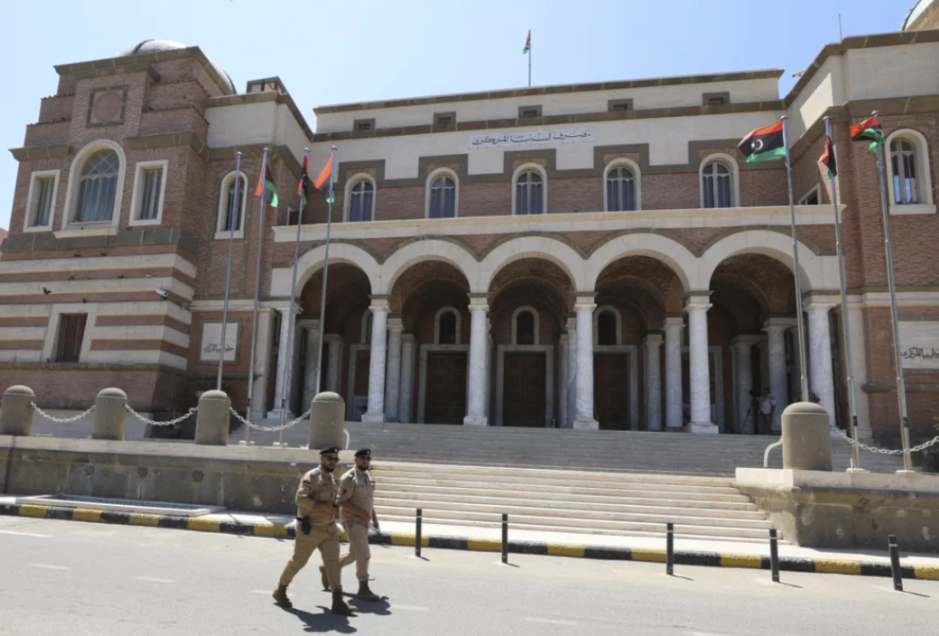Central Bank of Libya to print 30 bln dinar to ease liquidity crisis
Despite its abundance of oil, Libya has had a liquidity crisis for years.
-

Libyan soldiers guard the Central Bank headquarters in Tripoli, in August 2024. (AP)
Libya's central bank announced Thursday it contracted British firm De La Rue to print 30 billion dinars ($6.250 billion) worth of currency to "solve the liquidity shortage" in the country's commercial banks.
Last Sunday, the central bank announced that the liquidity crisis will be "gradually solved" by January, according to a board-approved plan.
Despite its abundance of oil, the country has had a liquidity crisis for years, with civilians queuing outside banks for cash and paychecks since Muammar Gaddafi's dictatorship was overthrown in 2011.
Libya's economy is primarily reliant on oil money, with state payrolls accounting for the majority of spending, amounting to 48.6 billion dinars from January to October out of 67.8 billion dinars in oil earnings during that time, according to central bank figures.
CBL Governor Naji Issa met with De La Rue CEO Clive Vacher and Michael Wilson, the business's regional supervisor, on Wednesday to discuss contract implementation, according to a statement from the bank.
"The meeting also discussed the schedule of dates for receiving the various shipments of currency," according to the bank.
CBL stated that it planned to withdraw outdated banknotes according to a timeline, although it did not give more details.
Libya resumed its oil production in September after the House of Representatives approved Naji Issa as the new central bank governor.
Talal Al-Mihoub, head of the defense and national security committee, confirmed that oil fields and ports, which were closed during the central bank crisis, reopened immediately.
"After the Libyan House of Representatives voted in favor of the agreement to appoint Naji Issa as the governor of the Libyan Central Bank and Marai Al-Barasi as his deputy, the process of reopening oil fields and ports closed during the central bank crisis will begin immediately," Al-Mihoub said.
The central bank had previously suspended operations in late August due to the kidnapping of a key official, Musab Msallem, the director of information technology at the Central Bank of Libya. However, operations resumed shortly after his release.
Bank Turmoil
In August 2024, Libya's Central Bank Governor Sadiq al-Kabir, along with other high-ranking bank officials, fled the country due to threats from militias amid the political divide in Libya.
This occurred after armed groups attempted to take control of the central bank building. Al-Kabir's safety concerns escalated, forcing him to seek refuge outside Libya.
The Presidential Council in Tripoli subsequently dismissed al-Kabir from his position. They appointed Mohamed Abdul Salam al-Shukri, a former deputy governor, as his replacement.
However, this decision was strongly opposed by both the eastern-based House of Representatives and the Tripoli-based High Council of State, who deemed the dismissal illegitimate and argued that any such decision should involve broader political consensus.
This crisis in leadership at the Central Bank has had wider implications, including the temporary closure of oil fields and ports during the turmoil.
The move to appoint Naji Issa as the new central bank governor in September 2024 was part of an effort to restore stability and resume oil production.

 3 Min Read
3 Min Read








